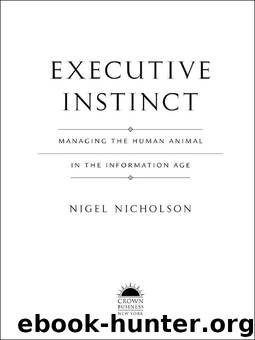Executive Instinct: Managing the Human Animal in the Information Age by Nigel Nicholson

Author:Nigel Nicholson [Nicholson, Nigel]
Language: eng
Format: mobi
Publisher: Random House, Inc.
Published: 2001-01-31T14:00:00+00:00
Social Biases
Almost all our biases are attuned to our social existence in one way or another. Whatever happened on the savanna, the most important day-to-day events involved other people and what they were doing. So we have an inborn tendency to tune in to people before things, people we know before people we don’t know, and people like ourselves before people who are different. If we are in doubt about what to do, we watch what other people are doing. Go to any meeting where a vote is taken. People with clear, strong opinions will wave their hands in the air as if claiming leadership. Others, less certain, will watch and go along with the people they like and respect or just follow the majority, rather than abstain.
This is a well-known psychological phenomenon known as herding. It has two drivers. One is finding the safest place in the herd, which is in the center, as it is the weaker members that straggle along the fringes and get picked off by predators. In many social situations we do not like to stand out, preferring to feel secure in a throng of others. This is part of the reassuring pleasure of being a spectator in a large crowd. The other aspect of herding is imitation—the tendency to follow the majority rather than figure out for yourself what to do.
Herding works both consciously and unconsciously in all kinds of decision making. It is what leads people to pass empty restaurants by. It causes shoppers to buy known name brands and firms to choose well-known rather than equally good but obscure suppliers, advisers, consultants, and other professional services. The logic is circular. Small suppliers are forced out of business because of prospective clients’ reasoning that they can’t be any good if other big firms don’t use them.
If people are challenged about their herding behavior, they are likely to protest that they are making a rational choice on the basis of objective attributes. But how different are we from our creature cousins when making difficult choices? In one species of grouse females appear to choose which male to mate with apparently on the merits of his display, so that one lucky male gets to account for more half the impregnations in a given group. Closer observation reveals that the females have actually been watching and following the choice of other females. If you are trying to make a close call—Is Dazzle really better than Sparkle?—why waste a lot of mental effort for a marginal payoff when you can simply buy the brand that most other people seem to prefer? Something similar seems to happen in markets. Exchange rate movements are almost completely unpredictable, but investors pile into and out of currencies in droves, creating largely meaningless “trends.” The performance rank order of mutual fund managers changes dramatically from year to year as investors chasing profits move in droves from last year’s favorites to this year’s.
Yet imitation makes evolutionary sense. It is better to base one’s
Download
This site does not store any files on its server. We only index and link to content provided by other sites. Please contact the content providers to delete copyright contents if any and email us, we'll remove relevant links or contents immediately.
Bad Blood by John Carreyrou(6606)
Rich Dad Poor Dad by Robert T. Kiyosaki(6588)
Principles: Life and Work by Ray Dalio(6395)
Playing to Win_ How Strategy Really Works by A.G. Lafley & Roger L. Martin(6199)
Management Strategies for the Cloud Revolution: How Cloud Computing Is Transforming Business and Why You Can't Afford to Be Left Behind by Charles Babcock(4562)
The Confidence Code by Katty Kay(4242)
Thinking in Bets by Annie Duke(4210)
American Kingpin by Nick Bilton(3866)
Delivering Happiness by Tony Hsieh(3408)
Project Animal Farm: An Accidental Journey into the Secret World of Farming and the Truth About Our Food by Sonia Faruqi(3208)
The Power of Habit by Charles Duhigg(3118)
The Tyranny of Metrics by Jerry Z. Muller(3055)
Brotopia by Emily Chang(3045)
The Marketing Plan Handbook: Develop Big-Picture Marketing Plans for Pennies on the Dollar by Robert W. Bly(3034)
Mastering Bitcoin: Programming the Open Blockchain by Andreas M. Antonopoulos(3032)
I Live in the Future & Here's How It Works by Nick Bilton(2977)
The Content Trap by Bharat Anand(2912)
Applied Empathy by Michael Ventura(2884)
Building a StoryBrand by Donald Miller(2883)
